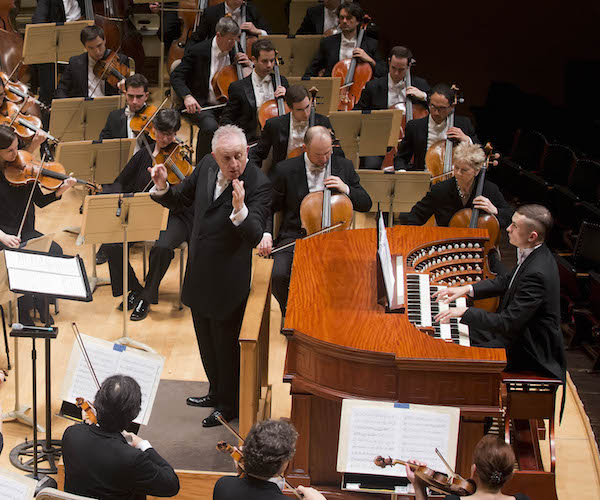Concert Review: Cameron Carpenter at Symphony Hall
Cameron Carpenter played the Terry Riley composition commandingly: he seemed equally happy as soloist in the foreground and, when so written, accompanist to the orchestra.

Conductor Bramwell Tovey, organist Cameron Carpenter, and the Boston Symphony Orchestra. Photo: Winslow Townson.
By Jonathan Blumhofer
One of the commendable quirks of recent Boston Symphony Orchestra (BSO) seasons has been the ensemble’s trotting out of new and unplayed entries from the massive canon of works for organ and orchestra. Two years ago, Olivier Latry debuted Michael Gandolfi’s Ascending Light. This week, the charismatic American virtuoso Cameron Carpenter made his Symphony Hall debut in pieces by Samuel Barber, Terry Riley, and Edward Elgar.
Barber’s Toccata festiva dates from 1960, when it was written to celebrate the dedication of the then-new Aeolian-Skinner organ at Philadelphia’s Academy of Music. Despite some granitic gestures and slicing fanfares, it’s a remarkably lyrical work, with more than a few bluesy, Gershwin-esque flourishes. While the orchestra is sometimes relegated to a celebratory accompaniment, there are lots of deft, colorful touches in the scoring that gamely imitate the solo instrument. And the organ part, appropriately, gives that instrument a thorough workout, exploring its many registrations and culminating with a brilliant cadenza for pedals alone.
On Thursday night, Cameron delivered the solo part with electrifying ease – the latter cadenza, with its nimble footwork, would make for knockout choreography on a dance floor – and, in the melodious parts, winning songfulness. Bramwell Tovey led the BSO in a stirring, if lopsided accompaniment, with winds, brass, and percussion all but obliterating the contributions of the strings in tutti sections.
Better balances won out in Riley’s At the Royal Majestic, a 2014 score for Carpenter and the Los Angeles Philharmonic’s storied organ, which that composer has dubbed “Hurricane Mama.” This was the BSO’s first performance of anything by Riley; let’s hope more will come our way soon.
Riley is, of course, one of the founding fathers of Minimalism, though there’s hardly a trace of that style in Majestic. Rather, the overriding ethos of of the piece might be described as “Charles Ives by way of Haight-Ashbury, ca. 1968.” There’s lots of fragmentation and textural layering. Echoes of pop music forms – namely rock and the blues – abound. At times it references earlier Riley classics like Poppy Nogood and the Phantom Band and A Rainbow in Curved Air. The sprawling whole, even if it doesn’t add up to the sum of its many parts, exudes a benign warmth and a mystic, slightly hippie, vibe.
Its most notable strength is the way Riley integrates the solo instrument into the orchestra. The music almost always seems to be playing aural tricks on the listener, especially in the gospel-tinged opening movement, “Negro Hall.” Here, winds, percussion, and organ bounce off one another in a weird phantasmagoria while the music’s several scenes shift in unpredictable, kaleidoscopic fashion.
The short middle movement, “Lizard Tower Gang,” builds to a furious, bluesy climax, while the finale, “Circling Kailash,” offers a sort of spiritual catharsis. The last features some of Riley’s best writing: swirling arpeggios; long-flowing, raga-like melodies; and bursts of dissonance as it approaches its endpoint.
Carpenter played it all commandingly – in Majestic, he seemed equally happy as soloist in the foreground and, when so written, accompanist to the orchestra – and Tovey, who gave a humorous spoken introduction to the piece, led the BSO in a sharply rhythmic and, overall, shapely reading that grew in strength as the evening proceeded.
Carpenter abruptly followed up Majestic with a pair of encores. Both were arrangements of his own (the “Gigue” from Bach’s French Suite no. 5 and Fly Me to the Moon), each brilliant show-stoppers, neither really fitting with the mood conjured up by the last pages of Majestic. Truly, as a performer, Carpenter seems to be our age’s Liszt of the Organ, for all that implies.
It might have been nice to continue the post-1960 American music thread over the concert’s second half – maybe with a Glass symphony or some Adams (say, Fearful Symmetries). Or it would have been welcome for the BSO to dip into its storehouse of mid-century American classics: perhaps some Harris, Schuman, Fine, or Shapero – even some short Bernstein and Copland selections would have fit. Even better would have been a treasure or two by George Whitefield Chadwick and/or Amy Beach.
Instead we got Elgar’s Enigma Variations. It’s a lovely piece, by all means, but the only apparent way it fit into Thursday’s program was that it allowed Carpenter to play the orchestral organ part (which, in the event, was scarcely audible).
Tovey’s interpretation was sometimes strong: the string playing was richly burnished at several points (including “C.A.E.” and “Nimrod”) and he conjured up a nice aura of mystery in central part of the penultimate “Romance.” But stretches of it were curiously detached. “H.D.S.-P.” took some time to gain its footing. “W.M.B.” bristled but without much playfulness. So did “Troyte.” And the finale offered a clinic in how to turn brass and percussion loose at the expense of the rest of the orchestral sound.
In a way it was thrilling – volume does have a certain effect and Thursday’s house responded lustily enough – but one hopes the reading will relax and fall into an easier groove over the next couple of concerts. Maybe.
Jonathan Blumhofer is a composer and violist who has been active in the greater Boston area since 2004. His music has received numerous awards and been performed by various ensembles, including the American Composers Orchestra, Kiev Philharmonic, Camerata Chicago, Xanthos Ensemble, and Juventas New Music Group. Since receiving his doctorate from Boston University in 2010, Jon has taught at Clark University, Worcester Polytechnic Institute, and online for the University of Phoenix, in addition to writing music criticism for the Worcester Telegram & Gazette.
Tagged: At the Royal Majestic, Boston Symphony Orchestra, Bramwell Tovey, Cameron Carpenter

